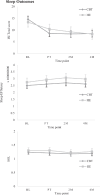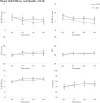Randomized controlled trial of cognitive behavioral therapy versus health education for sleep disturbance and fatigue following stroke and traumatic brain injury
- PMID: 39749423
- PMCID: PMC11681142
- DOI: 10.2340/jrm.v57.41302
Randomized controlled trial of cognitive behavioral therapy versus health education for sleep disturbance and fatigue following stroke and traumatic brain injury
Abstract
Objective: Evaluate efficacy of cognitive behavioural therapy for sleep and fatigue adapted for brain injury relative to health education control in alleviating sleep disturbance and fatigue after acquired brain injury.
Design: Parallel groups randomized controlled trial.
Subjects: 126 community dwelling adults with stroke or traumatic brain injury.
Methods: Participants were randomized 2:1 to receive 8-weeks of cognitive behavioural therapy for sleep and fatigue (n = 86) or health education (n = 40). The Pittsburgh Sleep Quality Index was assessed pre- and post-treatment, and 2 and 4-months post-treatment, with secondary measures of insomnia, fatigue, sleepiness, mood, quality of life, activity levels, self-efficacy, and actigraphy.
Results: Both groups showed improved sleep by 4-month follow-up. However, cognitive behavioural therapy for sleep and fatigue had significantly larger and more rapid improvements than health education immediately post-treatment (β = -1.50, p < 0.001, 95% confidence interval -2.35 to -0.64). There were no significant between-groups differences in fatigue; however, cognitive behavioural therapy for sleep and fatigue showed within-group gains on both fatigue measures immediately post-treatment and over time (β = -0.29, p = 0.047, 95% confidence interval -0.58 to -0.01). Health education had delayed improvements at 4-month follow-up on 1 fatigue measure.
Conclusions: Both cognitive behavioural therapy for sleep and fatigue and health education led to improvement in sleep and fatigue; however, effects were larger and more rapid for cognitive behavioural therapy for sleep and fatigue immediately post-treatment. This supports the efficacy of cognitive behavioural therapy for sleep and fatigue in acquired brain injury but also highlights that health education may result in delayed improvements in symptoms. ANZCTR Trial registration numbers: 1261700087830; 12617000879369.
Conflict of interest statement
Figures





Similar articles
-
Cost-effectiveness of cognitive behavioural therapy versus health education for sleep disturbance and fatigue following stroke and traumatic brain injury.J Rehabil Med. 2025 Apr 24;57:jrm42770. doi: 10.2340/jrm.v57.42770. J Rehabil Med. 2025. PMID: 40275692 Free PMC article.
-
Cognitive behavioural therapy versus health education for sleep disturbance and fatigue after acquired brain injury: A pilot randomised trial.Ann Phys Rehabil Med. 2021 Sep;64(5):101560. doi: 10.1016/j.rehab.2021.101560. Epub 2021 Aug 5. Ann Phys Rehabil Med. 2021. PMID: 34311119 Clinical Trial.
-
Cognitive Behavioral Therapy for Sleep Disturbance and Fatigue Following Acquired Brain Injury: Predictors of Treatment Response.J Head Trauma Rehabil. 2022 May-Jun 01;37(3):E220-E230. doi: 10.1097/HTR.0000000000000705. Epub 2021 Jul 26. J Head Trauma Rehabil. 2022. PMID: 34320552 Clinical Trial.
-
Treatment of sleep disturbance following stroke and traumatic brain injury: a systematic review of conservative interventions.Disabil Rehabil. 2022 Jun;44(13):2975-2987. doi: 10.1080/09638288.2020.1856948. Epub 2020 Dec 11. Disabil Rehabil. 2022. PMID: 33305982
-
Sleep disturbance and recovery during rehabilitation after traumatic brain injury: a systematic review.Disabil Rehabil. 2020 Apr;42(8):1041-1054. doi: 10.1080/09638288.2018.1516819. Epub 2019 Feb 1. Disabil Rehabil. 2020. PMID: 30707632
Cited by
-
Cost-effectiveness of cognitive behavioural therapy versus health education for sleep disturbance and fatigue following stroke and traumatic brain injury.J Rehabil Med. 2025 Apr 24;57:jrm42770. doi: 10.2340/jrm.v57.42770. J Rehabil Med. 2025. PMID: 40275692 Free PMC article.
References
Publication types
MeSH terms
LinkOut - more resources
Full Text Sources
Medical

